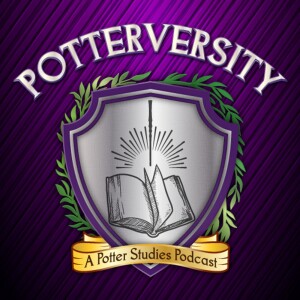
Potterversity: A Potter Studies Podcast
Arts:Books

Potterversity Episode 28: Literary Takes on Harry Potter
 2022-11-14
2022-11-14
Download
Right click and do "save link as"
For all its growth into a global media franchise, Harry Potter is first and foremost a work of literature.
Katy and Emily talk to Dr. Cecilia Konchar Farr, Professor of English and Dean of the College of Liberal and Creative Arts at West Liberty University and editor of the recent anthology Open at the Close: Literary Essays on Harry Potter. For all the scholarship the series has generated, many of the literary qualities of the books are frequently overlooked while attention is instead paid to the cultural phenomenon surrounding them.
The idea for Open at the Close germinated at the Harry Potter Academic Conference at Chestnut Hill College, where the series is examined from a wide variety of fields and perspectives. Cecilia discusses her chapter, co-written with Amy Mars, which uses digital humanities techniques to analyze the changing language throughout the series. Emily talks about her own chapter in the book, which also tackles the language of the series, albeit in a different way, asking what constitutes “good” writing and Potter’s style is often criticized. How have patriarchal standards influenced what is considered good literature?
J.K. Rowling has been a particularly hot button issue over the past few years, with some scholars reframing their approach and thinking more deeply about the idea of “death of the author.” Separating the art from the artist works better for some than others. Nonbinary contributor Tolonda Henderson decided to step away from Potter fandom and scholarship because of the author’s behavior. Cecilia, however, has long been more concerned with the relationship between books and readers than authorial intent. She believes that relatability and discussibility should be legitimate topics for discussion. Many influential writers throughout history have been deeply problematic, but their writing still holds significance and value. Whatever the author’s views, books in general, and the Potter books specifically, can - and have - made a difference.
Katy and Emily talk to Dr. Cecilia Konchar Farr, Professor of English and Dean of the College of Liberal and Creative Arts at West Liberty University and editor of the recent anthology Open at the Close: Literary Essays on Harry Potter. For all the scholarship the series has generated, many of the literary qualities of the books are frequently overlooked while attention is instead paid to the cultural phenomenon surrounding them.
The idea for Open at the Close germinated at the Harry Potter Academic Conference at Chestnut Hill College, where the series is examined from a wide variety of fields and perspectives. Cecilia discusses her chapter, co-written with Amy Mars, which uses digital humanities techniques to analyze the changing language throughout the series. Emily talks about her own chapter in the book, which also tackles the language of the series, albeit in a different way, asking what constitutes “good” writing and Potter’s style is often criticized. How have patriarchal standards influenced what is considered good literature?
J.K. Rowling has been a particularly hot button issue over the past few years, with some scholars reframing their approach and thinking more deeply about the idea of “death of the author.” Separating the art from the artist works better for some than others. Nonbinary contributor Tolonda Henderson decided to step away from Potter fandom and scholarship because of the author’s behavior. Cecilia, however, has long been more concerned with the relationship between books and readers than authorial intent. She believes that relatability and discussibility should be legitimate topics for discussion. Many influential writers throughout history have been deeply problematic, but their writing still holds significance and value. Whatever the author’s views, books in general, and the Potter books specifically, can - and have - made a difference.
More Episodes
Potterversity Episode 49: Playing Potter
 2024-03-11
2024-03-11
 2024-03-11
2024-03-11
Potterversity Episode 48: Self and Others
 2024-02-26
2024-02-26
 2024-02-26
2024-02-26
Potterversity Episode 46: Ancient Magic
 2024-01-22
2024-01-22
 2024-01-22
2024-01-22
Potterversity Episode 45: Occult Knowledge
 2024-01-08
2024-01-08
 2024-01-08
2024-01-08
Potterversity Episode 41: Terror and Trauma
 2023-09-18
2023-09-18
 2023-09-18
2023-09-18
Potterversity Episode 40: Live from LeakyCon
 2023-08-28
2023-08-28
 2023-08-28
2023-08-28
012345678910111213141516171819
Create your
podcast in
minutes
- Full-featured podcast site
- Unlimited storage and bandwidth
- Comprehensive podcast stats
- Distribute to Apple Podcasts, Spotify, and more
- Make money with your podcast
It is Free
- Privacy Policy
- Cookie Policy
- Terms of Use
- Consent Preferences
- Copyright © 2015-2024 Podbean.com




